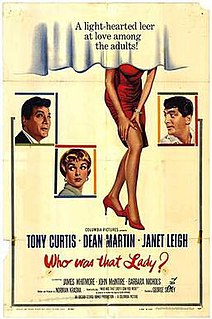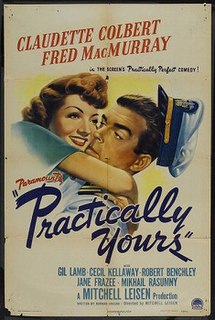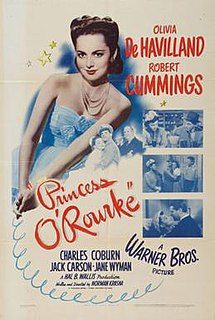Related Research Articles

Sir Reginald Carey "Rex" Harrison was an English actor. Harrison began his career on the stage in 1924. He made his West End debut in 1936 appearing in the Terence Rattigan play French Without Tears, in what was his breakthrough role. He won his first Tony Award for his performance as Henry VIII in the play Anne of the Thousand Days in 1949. He won his second Tony for the role of Professor Henry Higgins in the stage production of My Fair Lady in 1957.

Fred Ebb was an American musical theatre lyricist who had many successful collaborations with composer John Kander. The Kander and Ebb team frequently wrote for such performers as Liza Minnelli and Chita Rivera.

Playbill is a monthly U.S. magazine for theatergoers. Although there is a subscription issue available for home delivery, most copies of Playbill are printed for particular productions and distributed at the door as the show's program.

Joseph Calleia was a Maltese-born American actor and singer on the stage and in films, radio and television.

Ellen Greene is an American actress and singer. She has had a long and varied career as a singer, particularly in cabaret, as an actress and singer in numerous stage productions, particularly musical theatre, as well as having performed in many films and television series. Her best-known screen roles are as Audrey in the movie adaptation of Little Shop of Horrors, and as Vivian Charles in the ABC series Pushing Daisies.
Norman Krasna was an American screenwriter, playwright, producer, and film director who penned screwball comedies centered on a case of mistaken identity. Krasna directed three films during a forty-year career in Hollywood. He garnered four Academy Award screenwriting nominations, winning once for 1943's Princess O'Rourke, which he also directed.

Who Was That Lady? is a 1960 black and white American comedy film directed by George Sidney and starring Tony Curtis, Dean Martin, and Janet Leigh.

Practically Yours is a 1944 comedic film made by Paramount Pictures, directed by Mitchell Leisen, written by Norman Krasna and starring Claudette Colbert and Fred MacMurray.

Princess O'Rourke is a 1943 American romantic comedy film directed and written by Norman Krasna, and starring Olivia de Havilland, Robert Cummings and Charles Coburn. Krasna won the 1944 Oscar for Best Original Screenplay.
Dear Ruth is a successful 1944 Broadway play written by Norman Krasna. It ran for 680 performances.
Time for Elizabeth is a 1948 play written by Norman Krasna and Groucho Marx.
Louder, Please is a play by Norman Krasna, the first of Krasna's plays to be produced on Broadway. It was heavily influenced by The Front Page and also Five Star Final. He wrote it while working as a press agent at Warner Bros. and many of the characters were rumored to be based on real people. Krasna admitted the lead was based on publicity man Hubert Voight and other characters were based on Warners cameraman Buddy Longworth, Bernie Williams and Jack Warner.
The Man With Blond Hair is a play by Norman Krasna based on a true story. Although Krasna became better known for comedy this was a drama; the writer later said that he "really wrote" the play "to win the Nobel Peace Prize". The play only ran for 7 performances on Broadway. This failure prompted him to return to comedy and Krasna wrote Dear Ruth his most popular hit.
Love in E-Flat is a 1967 comedy play by Norman Krasna.
Watch the Birdie! is a 1964 comedy play by Norman Krasna.

Small Miracle is a 1934 play by Norman Krasna, presented on Broadway with Joseph Calleia in the featured role. Directed by George Abbott with a single setting designed by Boris Aronson, the three-act melodrama opened September 26, 1934, at the John Golden Theatre, New York. It continued at the 48th Street Theatre November 11, 1934 – January 5, 1935. On February 7, 1935, the play began a run at the El Capitan Theatre in Hollywood, with Calleia, Joseph King and Robert Middlemass reprising their Broadway roles.
Kind Sir is a 1953 play written by Norman Krasna and directed by Joshua Logan. It was the inspiration for the 1958 film Indiscreet.
Bunny is a play by Norman Krasna.
Sunday in New York was a 1961 American romantic comedy Broadway play written by Norman Krasna, produced by David Merrick, directed by Garson Kanin, and starring Robert Redford. It ran for 188 performances.
"We Interrupt This Program" is the fourth episode of the 2021 American television miniseries WandaVision.
References
- ↑ Patrick McGilligan, "Norman Krasna", Backstory: Interviews with Screenwriters of Hollywood's Golden Age, California Press p 217
- ↑ Theater Notes: Of Women and Angels With Hollywood Tans By ROBERT BERKVIST. New York Times February 9, 1975: 105.
- ↑ 'We Interrupt,' Situation Thriller, Arrives By CLIVE BARNES. New York Times April 2, 1975: 24.
- ↑ STAGE VIEW: Some Plays Have Endings, Others Just End Kerr, Walter. New York Times April 20, 1975: 5.
- ↑ Playbill Vault https://www.playbill.com/production/we-interrupt-this-program-ambassador-theatre-vault-0000001001 . Retrieved July 24, 2020.
{{cite web}}: Missing or empty|title=(help)